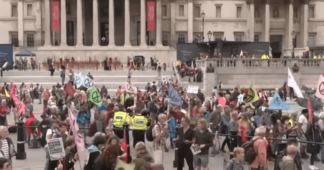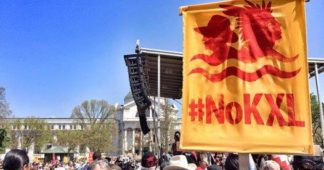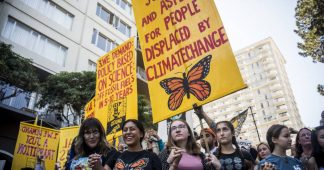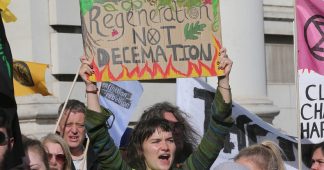October 15, 2021
This week over 530 climate activists were arrested during Indigenous-led civil disobedience actions in Washington, D.C., calling on President Joe Biden to declare a climate emergency and stop approving fossil fuel projects. Indigenous leaders have issued a series of demands, including the abolition of the Bureau of Indian Affairs, whose offices they occupied on Thursday for the first time since the 1970s. The protests come just weeks before the start of the critical U.N. climate summit in Glasgow, Scotland, which President Biden and senior Cabinet members are expected to attend. “We’re not going anywhere,” says Siqiñiq Maupin, with Sovereign Iñupiat for a Living Arctic, who traveled from Alaska to D.C. and was among those arrested during the BIA occupation. “We do not have time for negotiations, for compromises. We need to take this serious and take action now.” We also speak with Joye Braun, with the Cheyenne River Sioux Tribe and the Indigenous Environmental Network, who was deeply involved in the Standing Rock protests to stop the Dakota Access pipeline. “The United States government brought the frontlines to us, to the Indigenous people, to our doorsteps,” says Braun. “And we wanted to bring the frontlines to his doorstep to let him see that we are very serious about climate change and declaring a climate emergency.”
Transcript
AMY GOODMAN: This is Democracy Now!, democracynow.org, The War and Peace Report. I’m Amy Goodman.
We begin today’s show in Washington, D.C., where over 530 climate activists have been arrested in a historic week of civil disobedience calling on President Biden to declare a climate emergency and stop approving fossil fuel projects. The Indigenous-led protests have been part of a mobilization dubbed “People vs. Fossil Fuels.” On Thursday, Indigenous activists occupied the Bureau of Indian Affairs for the first time since the 1970s. Indigenous leaders issued a series of demands, including the abolition of the Bureau of Indian Affairs, restoration of 110 million acres of land taken away from Native nations, the return of Indigenous children buried at residential schools, and no new leases for oil and gas or extractive industries on public lands. Fifty-five people involved in the takeover were arrested. Indigenous activists have also been leading daily acts of civil disobedience outside the White House. This is a member of the Red Lakes in Minnesota speaking Monday.
RED LAKE ACTIVIST: We are the voice of the animals, we are the voice of the trees, because they don’t have the voice. Creator, to us, gave us stewardship over the land, so that’s what we are doing. We are fighting for clean water for future generations, for Mother Earth, for the world.
AMY GOODMAN: Indigenous youth activists are scheduled to lead a march to the U.S. Capitol today. This week’s protests in D.C. come just weeks before the start of the critical U.N. climate summit in Glasgow, Scotland. CNN is reporting President Biden is planning to attend along with 13 Cabinet members in the first week. But U.S. climate envoy John Kerry is already admitting the talks will likely fail to reach a global target on cutting greenhouse gas emissions. During a protest outside the White House Monday, Joye Braun of the Indigenous Environmental Network called on President Biden to uphold promises made to Indigenous communities.
JOYE BRAUN: You need to be held accountable. You made promises to the Indigenous communities across this land that you were going to uphold. But you haven’t upheld those promises. You’ve been speaking with a forked tongue, just like that one that was before you.
AMY GOODMAN: That was Joye Braun speaking Monday outside the White House. She’s joining us now in Washington. She’s a member of the Cheyenne River Sioux Tribe and a frontline community organizer with the Indigenous Environmental Network. She was deeply involved in the Standing Rock protests to stop the Dakota Access pipeline.
And we’re joined by Siqiñiq Maupin, the executive director of Sovereign Iñupiat for a Living Arctic. She lives in Fairbanks, Alaska. She was arrested yesterday during the occupation of the Bureau of Indian Affairs, and that’s where we’re going to begin.
Siqiñiq, can you talk about this protest? We didn’t know if we’d have you on the show today because we didn’t know if you were going to be getting out of jail, but we got word last night that you were.
SIQIÑIQ MAUPIN: Yes. We had gathered to let Biden know that we’re not going anywhere. Signing petitions and giving them and following these laws have not gotten us where we need to be. There is a climate emergency. People are dying right now. And we needed to make a statement. And I think that we did.
AMY GOODMAN: So, talk about what you’re demanding of the Bureau of Indian Affairs.
SIQIÑIQ MAUPIN: The BIA was created to erase Indigenous people. It has always been against us. And today, or yesterday, and every day, we demand that it be abolished. We do not need a blood quantum to say how Indigenous we are or to qualify that. We know our Indigenous ways to protect this land, this Earth, this water. And we understand that the Earth is unbalanced. And we do not have time for negotiations, for compromises. We need to take this serious and take action now.
AMY GOODMAN: Can you talk about what happened in August, when your group, along with others, were able to get the U.S. District Court Judge Sharon Gleason to throw out the approvals of a major oil project in your state of Alaska?
SIQIÑIQ MAUPIN: Yes. That was a extraordinary time, considering, during the heart of the pandemic in 2020, the Bureau of Land Management decided to hold the hearings for opening the Willow Master Project, located outside of Nuiqsut, where my mother lives and my family is from. And we heard testimony from tribal administrators, corporation presidents, Native corporation presidents, begging the Bureau of Land Management to stop these hearings until the pandemic was over, until we got it under control. And they, quite literally, did not listen. You can just hear sobbing, and they continued on. They made the record of decision. And it felt a little hopeless, especially with Biden’s approval of this project even though he promised he was going to take the climate crisis serious. So, having the 9th Circuit overthrow this was such a big win, especially when the corruption is so rampant within our government.
AMY GOODMAN: Can you talk about specifically your action yesterday? I think it was reported some 55 water protectors were arrested and taken from the Bureau of Indian Affairs. And to talk about how significant this is, the last time it was occupied was by Native Americans in the 1970s. On November 3rd, 1972, a group of 500 American Indians with the American Indian Movement took over the Interior building, the culmination of a cross-country journey that was called the Trail of Broken Treaties, intended to bring attention to Native American issues, such as living standards and treaty rights. Why did you focus on the BIA? Are you calling for it to be disbanded?
SIQIÑIQ MAUPIN: Yes. And we wanted to make a statement that we are still here. We have been fighting against the genocide of our people, colonization, since contact. And we are not going away. We came with matriarchs that led us, and that was, I think, a powerful statement to have our women come in front again and to lead us into that building. I followed their guidance. And we were able to, again, make a statement at the BIA, an organization created to, quite literally, erase us from this place, this Earth, with blood quantum. We do demand the abolishment of BIA and to also say that Indigenous people have always been the caretakers of this land, and we will continue to be the caretakers.
AMY GOODMAN: I want to bring Joye Braun into this conversation, a member of the Cheyenne River Sioux Tribe, frontline community organizer with Indigenous Environmental Network, which organized this week of historic protest. I dare say, with President Biden now saying he and 13 members of his Cabinet are going to go to the U.N. climate summit in Glasgow, may well be a result of what you all have done this week right outside the White House. We last talked to you, Joye, at the standoff at Standing Rock. Can you talk about the organizing of this week, what’s happened and what you want to see come out of it? You, along with over 500 people, like Siqiñiq, have been arrested.
JOYE BRAUN: Hi. It’s good to be on the show again and to see you today.
Well, I certainly hope that President Biden is listening. You know, the United States government brought the frontlines to us, to the Indigenous people, to our doorsteps, and we wanted to bring the frontlines to his doorstep, to let him see that we are very serious about climate change and declaring a climate emergency.
People vs. Fossil Fuels came out of Build Back Fossil Free, a coalition of over 200 frontline organizations around the United States that came together and said, “We’re not being heard. We’re not being listened to. And we have to unite. We need to unite together to let this administration know that we are serious, and, you know, we’re tired.”
We go to all the hearings. We do the petitions. We make the phone calls. And it’s not working. They’re still allowing pipelines to go through illegally. Dakota Access pipeline is still an illegal pipeline. And, of course, they did not do a full EIS o Line 3, and they’re ignoring treaty rights on Line 5 and Mountain Valley pipeline.
AMY GOODMAN: Joye, these protests are historic. You knew people who, back in the 1970s, were part of that AIM takeover, the American Indian Movement takeover, of the Bureau of Indian Affairs?
JOYE BRAUN: I was a little kid back in the 1970s, so that I was, like, maybe like 3 years old. So I was just a toddler at that time. But we definitely heard about those times. And we did have elders with us this week who were part of that particular movement in the ’70s.
What happened this time, again, was organic. There was no leadership. It was just the people saying that we need to go and make a statement that the Bureau of Indian Affairs has — you know, it only was designed to eliminate us, like my new daughter — because we like to adopt children — like my new daughter Siqiñiq has said. We need to erase blood quantum. What other people in the world must still carry a card saying what percentage of blood you are, like a horse or a dog? I mean, that’s crazy.
So, plus, you know, the DOI did give 2,500 new oil and gas leases on BLM property, when President Biden said, “Oh, we’re going to stop all new leases,” but then opens it back up and then also threatens the Arctic with new leases, and the Gulf Coast, of course, with new leases and new LNG projects.
AMY GOODMAN: Can you describe some of the other actions, Joye, that have been taking place in Washington? For example, the Andrew Jackson statue in Lafayette Park across the street from the White House was — the words “expect us” were written across it. What did that mean?
JOYE BRAUN: Well, it came out of “Respect us or expect us.” And that is a saying that was said, geez, many, many times over the years during the fight, from the 1970s and ’80s, in the ’90s. It was something that one of my mentors, Deb White Plume, used to say. And, of course, I said it at Standing Rock when we were at Treaty Camp. But I woke up, like many people, and saw the redecoration of that statue. Jackson was the one that caused mass genocide to Indigenous people. I mean, tens of thousands of Indigenous people died at his hands, and, of course, started the Trail of Tears, for many tribes, including the Cherokee.
AMY GOODMAN: Earlier this week, protesters climbed a flagpole outside the Army Corps of Engineers office demanding a stop to the Line 3 crude oil pipeline?
JOYE BRAUN: Yes, yes. I was there. Two flagpoles were climbed by Indigenous activists. And the flags were — those became coup presents. We kind of grabbed and nabbed them. But, you know, that’s kind of something that we would have done if we were in battle. We like to go grab the enemy’s flag. So that’s what happened.
AMY GOODMAN: Yet, at the same time, you have the first Indigenous, the first Native American cabinet member to be named, under — and this was under President Biden, Deb Haaland, who is a former congressmember from New Mexico. She is the interior secretary. Now, according to AP, she was not in the Interior Department’s building, where the BIA is, the Bureau of Indian Affairs, on Thursday. But can you talk about her role and if you’ve had conversations with her?
JOYE BRAUN: Well, of course, different organizations have been trying to reach out to who we call Auntie Deb. We love Auntie Deb. Make no doubt about it. We love Auntie Deb. We love that she was appointed by President Biden. We love that she’s been able to get some really good, positive work done. However, her hands have been tied by the Biden administration when it comes to climate change. Like I said, the DOI allowed 2,500 new oil and gas leases, when President Biden could have said, “We’re going to stop them, and we’re not going to allow this to happen.”
In order for us to truly make a climate change in the world, in order for us to say, “Hey, we are leaders in climate,” then we must stop all new oil and gas infrastructure, especially on public lands. And unfortunately, Auntie Deb hasn’t been able to do those types of things because her hands are tied by the Biden administration’s policies.
So, we love Auntie Deb. She’s doing an amazing job. We’re really, really proud of her. But President Biden needs to be held accountable for not following through.
AMY GOODMAN: Siqiñiq Maupin, we’re giving you the last word. You came down from Alaska, a leading Indigenous rights activist at your young age. What do you take away from this week?
SIQIÑIQ MAUPIN: I take away knowing that this is not an isolated incident in Alaska, where children are getting cancer, asthma. We are seeing our caribou with black bone marrow, with mold on our fish. And we come to our relatives, and the same things are happening in communities all over the world. And we are saying enough is enough, and standing with leadership with no leader but an entire group of an Indigenous peoples and allies that are saying, “Expect us,” because we have not been respected.
AMY GOODMAN: We thank you both for being with us. Siqiñiq Maupin is the executive director of the Sovereign Iñupiat for a Living Arctic, and Joye Braun, member of the Cheyenne River Sioux Tribe, a frontline community organizer with the Indigenous Environmental Network, which has organized this historic civil disobedience in Washington that have lasted throughout the week. At this point, over 530 people have been arrested.
We remind our readers that publication of articles on our site does not mean that we agree with what is written. Our policy is to publish anything which we consider of interest, so as to assist our readers in forming their opinions. Sometimes we even publish articles with which we totally disagree, since we believe it is important for our readers to be informed on as wide a spectrum of views as possible.











